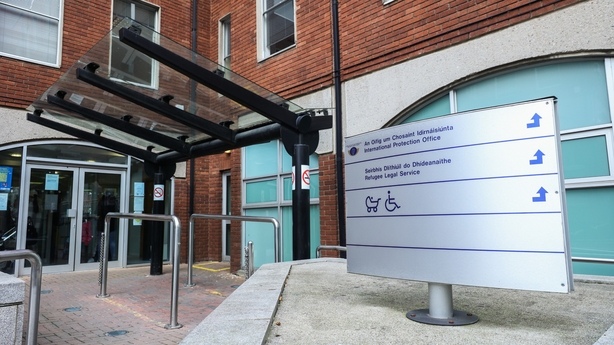The High Court has found that the Government is in breach of its legal obligations towards a 17-year-old minor who fled Afghanistan in November last year and sought international protection in Ireland in February.
A judicial review was carried out into the case of the Afghan national whose father was killed by the Taliban in September last year.
It is a "lead case" with implications for other international protection applicants.
Applicants arriving in Ireland are entitled to "material reception conditions", including accommodation, shelter and food, along with basic conditions for hygiene under the European Communities (Reception Conditions) Regulations 2018.
The directive, as transposed into Irish law, also entitles applicants to a daily expenses allowance and the provision of clothing by financial allowance.
The Government was also found to be in breach of regulations under the Charter of Fundamental Rights of the EU, in particular Article 1 that "human dignity is inviolable" and must be respected and protected.
Instead, the teenager had found himself sleeping rough on benches, parks and train stations for more than three weeks, during which time he did not have enough food to eat and had to resort to begging.
He was occasionally provided with food by other Afghani people who he met on the streets.
The judgment delivered by Mr Justice Charles Meenan noted he had felt constantly scared and in danger during this period and had also been threatened with a knife in a demand for €5.
He said he also had not had access to bath or shower facilities and could not change his clothes, adding he had felt "ashamed, humiliated and degraded".
Read more:
Warning that asylum seekers face 'street homelessness'
'Grim milestone' as 501 news asylum seekers without State accommodation
The teen had arrived in Ireland in February of this year, having left Afghanistan in November last year before travelling through Iran, Turkey, Bulgaria, Italy, France and then England with the assistance of a "people smuggler" arranged by his eldest brother.
He applied for international protection in Ireland on 8 February this year, without having documents to prove his age.
The boy was interviewed by social workers on behalf of the International Protection Office, who told him they believed him to be an adult and not a minor.
He was told there was no accommodation available to him and was given a voucher for €25 for Dunnes Stores to buy bedding, along with an address for the Capuchin Day Centre, a private charity.

He subsequently obtained documentation from Afghanistan to prove he was a minor, but the judgment noted that the matter of an "age assessment" remains under review by the Child and Family Agency.
Mr Justice Meenan said there were others in a similar situation and that this was a "lead case" aimed at identifying the legal issues involved and the teenager's entitlements.
The judicial review found that what was provided by the Minister for Children, Equality, Disability, Integration and Youth had fallen far short of what was required.
Since proceedings were initiated, accommodation has now been provided to the teenager, but the court noted many others in a similar situation to the applicant had not been offered accommodation, even after several weeks.
Minister Roderic O'Gorman had submitted a statement of opposition in which he admitted that the applicant had not been afforded the "material reception conditions" to which he was entitled under legislation, citing a chronic shortage of available accommodation.
In a replying affidavit, he said the number of people seeking international protection had grown considerably in recent years with some 1,931 having applied for international protection up to March of this year, the problems compounded by the numbers fleeing Ukraine.
The affidavit set out the steps taken by the minister to procure other further accommodation for those seeking asylum here.
It is understood the minister's office is now examining today's judgment.
Mr Justice Charles Meenan said there was nothing academic or theoretical about the rights that the applicant sought to enforce and that being denied these conditions had had a direct impact on his quality of life.
He put the matter back for mention on Friday 12 May to deal with costs and any further submissions from parties.
The Irish Refugee Council believes this is the first time that the Irish Government has been found in breach of Article 1 of the EU Charter of Fundamental Rights, which states that "human dignity is inviolable" and "must be respected and protected."
We need your consent to load this rte-player contentWe use rte-player to manage extra content that can set cookies on your device and collect data about your activity. Please review their details and accept them to load the content.Manage Preferences
'Absolutely inhumane'
Meanwhile, Sinéad Gibney, Chief Commissioner of the Irish Human Rights and Equality Commission has said that the State's treatment of some people seeking international protection is "absolutely inhumane."
Speaking on RTÉ's Drivetime, Ms Gibney said: "In terms of accommodation, we know that there are people who have been in this situation since the middle of February.
"I appreciate that there is an (housing) emergency but how long can an emergency go on? Direct Provision itself is an emergency that was established nearly 25 years ago today.
"This cannot be the status quo. We cannot normalise the experience of people arriving at our shores and receiving this kind of treatment.
"It is absolutely inhumane. I don’t believe that the State is doing enough. I do believe that the State can do more.
"It has been in emergency response for so many years, we are just pouring money into non-permanent solutions.
"We are not providing the people who need it with the material reception conditions that we're legally required to provide them with."






